المراقبة والتقييم
لا تتعلق معظم تحديات الرصد والتقييم، مثل الافتقار إلى الاستثمار والقدرات الكافية، تحديدًا بالمساعدات النقدية والقسائم. لكن تلك التي تتعلق في المقام الأول برصد نتائج عمليات النقل غير المقيدة. ويمكن أن تجعل مرونة التحويلات النقدية من الصعب تحديد مؤشرات النتائج المناسبة، لأنها قد تتضمن مجموعة من المؤشرات القطاعية والشاملة. وفي الوقت نفسه، هناك قيود على جمع بيانات دقيقة حول كيفية إنفاق التحويلات النقدية.
التزم الموقعون على الصفقة الكبرى بضمان وجود آليات الرصد والتقييم ذات الصلة فيما يتعلق بالنقد، وزيادة فهم التكاليف والفوائد والآثار والمخاطر المتعلقة بالنقد بالنسبة للطرائق الأخرى. بناءً على ذلك، يحتوي مسار الصفقة الكبرى على نقاط عمل بما في ذلك تطوير مؤشرات نتائج مشتركة للمساعدات النقدية متعددة الأغراض، ومقاييس لتحليل القيمة مقابل المال. تم تقييد التحليل المنهجي للقيمة مقابل المال بسبب عوامل تشمل عدم وجود نهج متفق عليها، والحاجة إلى بيانات نتائج عالية الجودة، وطبيعة التحليل.
الأولويات الحالية
في إطار الالتزامات النقدية للصفقة الكبرى، شاركت شبكة CALP (مع الوكالة الأمريكية للتنمية الدولية وخدمات الإغاثة الكاثوليكية) في تطوير مؤشرات النتائج للمساعدات النقدية متعددة الأغراض. وتُتاح مسودة الاختبار حاليًا باللغات الإنجليزية والفرنسية والإسبانية عبر مكتبة شبكة CALP.
Related initiatives
Featured content

Multipurpose Cash Outcome Indicators – Final Draft for Testing
Guidelines and Tools
Note that the MPC indicators have now been revised. Please click here to access the updated Multipurpose Outcome Indicators and Guidance, which is available in Arabic, English, French and Spanish. Multipurpose Cash Outcome Indicators – Final Draft for Testing Multipurpose cash (MPC) is a type of assistance intended to enable people to meet their basic needs through local...

Monitoring 4 CTP: Monitoring Guidance for CTP in Emergencies
Guidelines and Tools
This guidance provides a central resource to promote a common understanding of the most important monitoring considerations for humanitarian projects using cash transfer programming (CTP). The primary audience for this guidance is field-level practitioners, from organisations directly involved in the design, implementation, monitoring, and accountability of projects using cash and vouchers...

Cost-Efficiency Analysis of Basic Needs Programs: Best Practice Guidance for Humanitarian Agencies
Guidelines and Tools
The Efficiency, Effectiveness and Value for Money Sub-Workstream is pleased to share the final output on Cost-Efficiency Analysis of Basic Needs Programs: Best Practice Guidance for Humanitarian Agencies (attached).
Cost-efficiency analysis estimates the ratio of program costs to outputs created, allowing you to compare cost-per-output for programs which all produced the same output. Such...
Thematic lead
Latest

Brief: Towards shock-responsive social protection: lessons from the COVID-19 response in Uganda
Policy paper
This policy brief presents highlights from the Uganda country case study on the social protection responses to COVID-19. The brief summarizes the key findings and sets out recommendations to strengthen the foundational social protection systems and enhance the ability of the sector to respond to future...
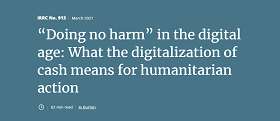
“Doing no harm” in the digital age: What the digitalization of cash means for humanitarian action
Policy paper
Cash transfers have changed the way the humanitarian sector delivers assistance, and at the same time, digitalization is changing the way our world works in fundamental ways. The digitalization of cash means that the simple click of a button can put money in the hands of hundreds of thousands, if not...

Cash Hub Webinar 19: Learning from COVID-19 response – The Use of Cash and Markets in the Red Cross Red Crescent Movement
Members event
Since the outset of COVID-19 response many Red Cross Red Crescent National Societies (NS) have increased their use of Cash and Voucher Assistance (CVA). In this Webinar the Sierra Leone Red Cross and Pakistan Red Crescent Society will share information on their programmes, their challenges and learning.

Data Responsibility in Cash and Voucher Assistance – a toolkit for 2021
Blog Post
Linda Raftree, author of the CALP Network’s ‘Data Responsibility Toolkit for CVA Practitioners’, tells us about this new publication and what it means for people working in the field of cash and voucher assistance (CVA).

Leaving No One Behind: Leveraging partnerships, technology and trust in cash-based interventions in the Syria response
Members event
Side event: Brussels V conference. With food insecurity reaching record levels in the region, the event will showcase cash transfers as an effective modality of assistance for refugees, displaced persons and other vulnerable populations in achieving food security and related sector outcomes. Co-Hosts: WFP...
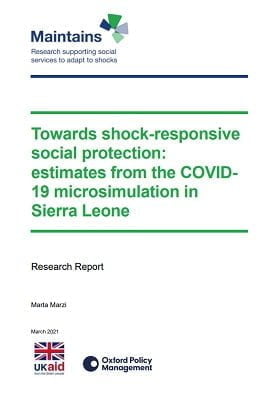
Towards shock-responsive social protection: lessons from the COVID-19 response in Sierra Leone: Estimate from the microsimulation
Report
This report presents the methodology and results of a microsimulation based on a partial equilibrium modelling framework using nationally representative household-level data for Sierra Leone. The findings include an estimate of the potential impact of COVID-19 on poverty in the country based on a model...

CVA, plus information: what happens when cash recipients are kept in the loop?
Blog Post
Max Seilern and Hannah Miles from Ground Truth Solutions reveal the positive impacts of simply being more open about cash programming with cash recipients.
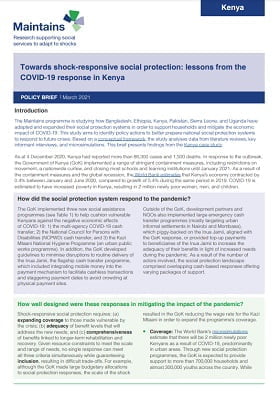
Brief: Towards shock-responsive social protection: lessons from the COVID-19 response in Kenya
Policy paper
This policy brief summaries the key findings and recommendations from the Kenya country case study on the social protection responses to COVID-19. The brief provides an analysis of the key enablers and constraints to the effective delivery of the social protection response in Kenya. The brief also...
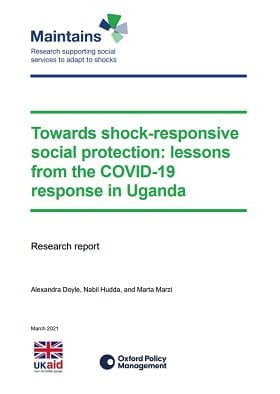
Towards shock-responsive social protection: lessons from the COVID-19 response in Uganda
Report
The stringent lockdown measures and global economic slowdown, due to COVID-19, are likely to have a large impact on poverty in Uganda. This report documents how the Government of Uganda plans to implement an Urban Cash for Work Programme to mitigate the impact of the pandemic on vulnerable populations....

تبسيط البيانات. تضخيم الحماية. محادثة أساسية للعاملين في مجال المساعدات النقدية والقسائم.
ندوة عبر الإنترنت
خلفية مع تزايد بُعد المساعدات الإنسانية ورقمنتها في ظل الوباء، أصبحت البيانات سلعة وسلاحًا، كيف نحمي أولئك الذين نهدف إلى مساعدتهم؟ أكثر من أي وقت مضى، يجب التعامل مع...

COVID-19 and the Emergency Social Safety Net (ESSN) and Conditional Cash Transfers for Education (CCTE) programmes
Guidelines and Tools
FCDO Turkey commissioned SPACE to assess the impact of COVID-19 on the principal cash vehicles active in Turkey: Emergency Social Safety Net (ESSN) and Conditional Cash Transfers for Education (CCTE) programmes, both funded by the EU through the EUR 6 billion Facility for Refugees in Turkey (FRiT)...

Inclusive Information Systems for Social Protection: Intentionally Integrating Gender and Disability
Policy paper
Digital information systems serving the social protection sector, and especially social assistance, are increasingly prominent and will continue to be, as is the case within all other sectors. “Why? Because the ability of a country to care for its people and respond to their lifecycle needs depends on...
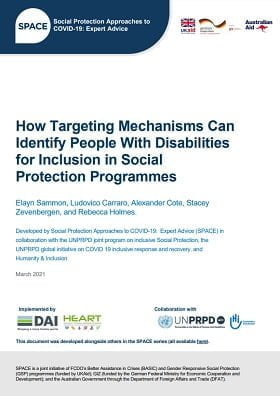
How Targeting Mechanisms Can Identify People With Disabilities for Inclusion in Social Protection Programmes
Guidelines and Tools
Persons with disabilities have worse education, health and employment outcomes and are more vulnerable to shocks than persons without disabilities. At the same time, they are less likely to be enrolled in social protection programmes, including those for which they are eligible. They can face significant...

Data simplified. Protection amplified. An essential conversation for CVA practitioners.
Webinar recording
As humanitarian aid becomes increasingly remote and digitized in the pandemic, and data is both a commodity and a weapon, how do we protect those we aim to help? More than ever, data must be treated as an extension of the individual and as an essential part of humanitarian protection. the CALP...
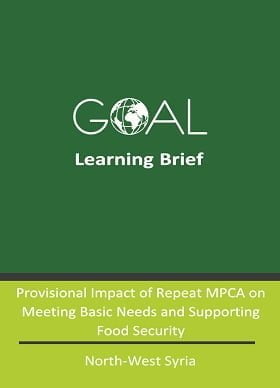
Provisional Impact of Repeat MPCA on Meeting Basic Needs and Supporting Food Security in North-West Syria
Policy paper
In the North-West Syria response, cash assistance is mostly once-off or else for a maximum of 3 months. GOAL Syria is delivering a large-scale value voucher or food kit response to support food security needs. However, needs assessment repeatedly show that households have high non-food needs along with...

Brief: Towards shock-responsive social protection: lessons from the COVID-19 response in Ethiopia
Policy paper
COVID-19 and national and international measures to curb its spread, may have pushed 15 million more people below the poverty line in Ethiopia. This policy brief draws on key learnings from the Ethiopia country case study, focused on the social protection response to COVID-19 and identifies...
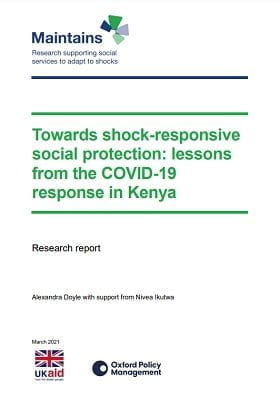
Towards shock-responsive social protection: lessons from the COVID-19 response in Kenya
Report
The stringent lockdown measures and global economic slowdown, due to COVID-19, are likely to push more than 2 million people into poverty in Kenya. This study documents the Government of Kenya’s social protection response to mitigate the negative impact of the pandemic on vulnerable households and...

Towards shock-responsive social protection: lessons from the COVID-19 response in Pakistan
Report
The stringent lockdown measures and global economic slowdown, due to COVID-19, are likely to increase the poverty rate in Pakistan by 35 percentage points in urban areas and 32 percentage points in rural areas. The report documents the Government of Pakistan’s social protection response to mitigate the...

Brief: Towards shock-responsive social protection: lessons from the COVID-19 response in Pakistan
Policy paper
This policy brief draws on key learnings from the Pakistan research report and microsimulation report on the social protection responses to COVID-19. The brief provides analysis of the factors that enabled and constrained the effectiveness of the delivery of social protection in Pakistan and also provides...
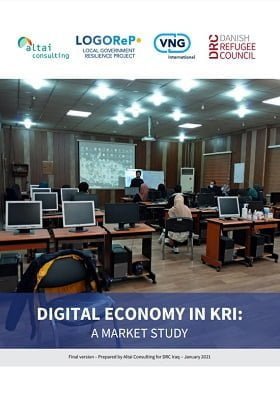
Digital economy in KRI: A market study
Report
The objective of the research was to assess the opportunities and challenges for digital technologies to promote economic growth and employment creation for host communities and refugees in Kurdistan Region of Iraq. The findings of this report will then be used to design curricula for digital skills which...
